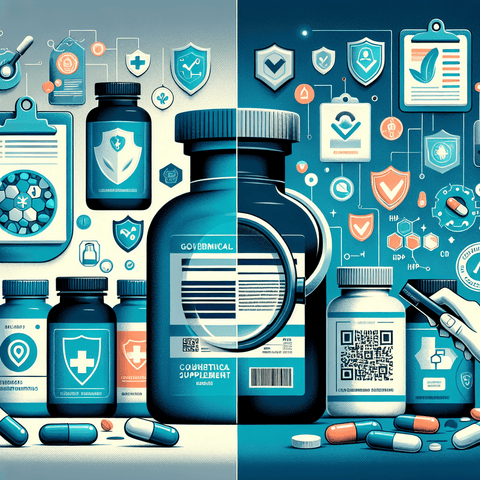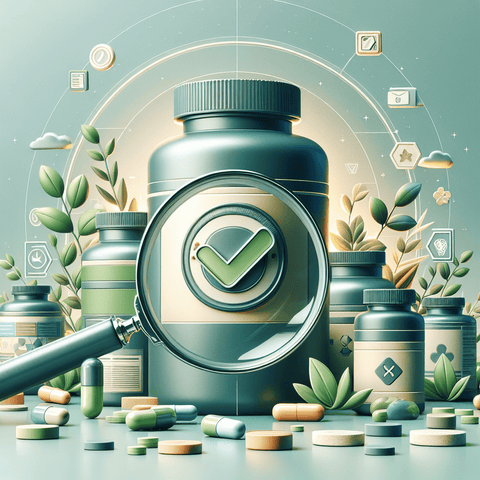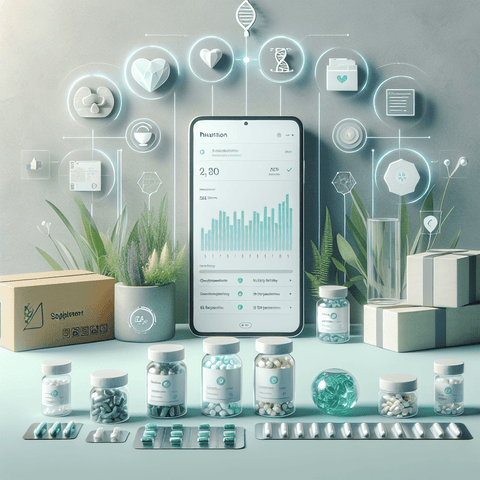Introduction
In recent years, the global interest in nutritional supplements has surged, driven by growing awareness about personal health, wellness trends, and preventive healthcare measures. From supporting the immune system and maintaining bone health to enhancing energy levels and managing stress, dietary supplements play a key role in everyday wellness routines. However, this increased demand has also opened the gates to a serious concern: the proliferation of counterfeit supplements and online scams.
Counterfeit products can pose real dangers to your health. These fakes may contain incorrect ingredients, no active ingredients at all, or even harmful fillers. Coupled with aggressive online scams, many consumers unknowingly fall victim to fraudulent sellers, wasting money and putting their well-being at risk.
But knowledge is power. In this comprehensive guide, we'll teach you how to identify counterfeit supplements and avoid online supplement scams. Whether you shop frequently on supplement websites or you’re new to the world of wellness, this resource will help you make more informed, safe decisions when purchasing vitamins and dietary supplements online.
We’ll explore what counterfeit supplements look like, how to differentiate real from fake, and which online practices should raise some red flags. We’ll also guide you through using reputable tools and checking trusted sources—like Topvitamine.com—to verify the authenticity of your health products. Let’s dive in and empower you to be a smarter supplement shopper.
I. The Hidden Dangers of Counterfeit Supplements: What You Need to Know
Counterfeit supplements are fake or imitation products that are falsely marketed and sold under the guise of legitimate dietary supplements. These are not simply “cheap knock-offs”—they pose serious risks to consumers. A counterfeit supplement may completely lack the essential vitamins or nutrients advertised, contain incorrect dosages, or be laced with substances that are unapproved or harmful.
In the world of nutritional supplements, counterfeiting can range from simple label misrepresentation to complex schemes involving fake certificates and copied packaging. Often made in unregulated facilities with no quality control or testing, these illegitimate products can have severe consequences. For example, instead of vitamin D, you might be ingesting ingredients that disrupt hormonal function or cause allergic reactions.
Some alarming statistics drive the point home. According to the World Health Organization (WHO), as much as 10% of medical products in low and middle-income countries are substandard or falsified. The U.S. FDA has also issued several warnings over the years about tainted or counterfeit supplements on the market, some of which were found to contain prescription drug ingredients without proper disclosure.
Consuming counterfeit supplements can result in ineffective treatment, unexpected side effects, or long-term health damage. Mislabeling alone can lead to dosage mismanagement, especially for supplements like vitamin D, where overdosing could bring about hypercalcemia or other issues.
Given this risk, it’s clear why consumer awareness is more important than ever. Users must ensure they’re sourcing from verified retailers, evaluating packaging, and understanding what goes into their supplements. The rest of this guide empowers you to adopt safer shopping behaviors so you can confidently support your health goals.
II. How to Spot Fake Vitamins: Red Flags and Warning Signs
Fake vitamins come in many forms and are not always easy to detect. Some may replicate legitimate products closely, while others are obvious fakes made with zero regard for safety. To better protect yourself, you must learn the warning signs of suspicious supplements.
First and foremost, visually inspect the packaging. Common red flags include poor print quality, grammatical errors, misspelled ingredient names, or shifting fonts and colors. Fakes might use generic containers or labels that differ slightly from official variants of known brands. Examine pill consistency and color—if the contents vary in appearance or smell different than usual, this may indicate tampering or counterfeit origin.
Be wary of inconsistent dosage information. If the label claims 200% of your recommended daily intake without any supporting documentation or clarification, it could be misleading or unsafe. Spotting outrageous health claims is another clue. Phrases like “cures all diseases” or “works instantly” are unsubstantiated and violate EU regulations around health supplements.
Examining the expiration date and batch or lot number is critical. Legitimate supplements will clearly display this information, often both on the outer packaging and the bottle. Lack of such details or handwritten labels are huge red flags, especially with time-sensitive nutrients like vitamin C, which can degrade over time if not stored properly.
The biggest danger zone is buying from unverified third-party sellers, especially on auction platforms or shady websites. If a seller claims to be offering a well-known product at a massive discount—say 70% or more off the retail price—tread carefully. These are often fronts for counterfeit distribution and could harm your health rather than help it.
To better illustrate, compare an authentic bottle of branded magnesium supplements with a counterfeit found online. You’ll notice subtleties in logo placement, incorrect French or German translations, or missing manufacturer details. Pay close attention to these cues the next time you shop.
III. Supplement Authenticity: How to Ensure You're Getting the Real Deal
Authentic supplements are those manufactured under strict quality guidelines, with all ingredients declared truthfully, produced in monitored facilities, and distributed legally. Ensuring supplement authenticity is your first and most effective line of defense against counterfeits and scams.
The gold standard begins with certifications. Look for indicators like GMP (Good Manufacturing Practices), NSF (National Sanitation Foundation), or USDA Organic for organic products. These third-party verifications signal that the supplement brand adheres to trustworthy manufacturing practices and regular inspections.
An authentic product will include vital product details such as batch number, production date, expiration date, and place of manufacture. Batch numbers are particularly useful—you can often contact the company directly to confirm whether a certain batch is legitimate. Some companies even offer QR codes on the bottle that link directly to lab test results—a practice increasingly seen with omega-3 products like DHA and EPA supplements.
Another critical element is ingredient transparency. Reputable manufacturers disclose all ingredients, including binding agents and potential allergens. They also subject their products to third-party lab testing and openly publish these findings on their websites or brochures. If a product lacks any mention of lab validation, proceed cautiously.
Where you buy your product from is just as important as what product you buy. Purchasing directly from the manufacturer's website or from authorized retailers such as Topvitamine.com reduces the risk significantly. These sellers prioritize safety, transparency, and customer support. Avoid “too-good-to-be-true” pricing and opt instead for providers that offer money-back guarantees, traceability, and genuine customer reviews.
Finally, when starting a new supplement regimen—even for common nutrients like vitamin K—consult your healthcare provider to align your personal needs with your chosen product. Supplement authenticity starts with informed decisions.
IV. Spotting Fake Supplements Online: Top Tips for Smart Consumers
The internet is a double-edged sword. While it’s incredibly convenient for purchasing supplements, it’s also a hub for counterfeit sellers, phishing sites, and fraudulent companies posing as legitimate distributors. Here’s how to shop smartly and safely online.
First, scrutinize the website hosting the product. Is the URL legitimate? Does the seller have a proper “About Us,” contact information, and return policy? Scam websites mimic trusted retailers by using similar domain names or page design. Avoid sites that lack a physical address or customer service number.
Check customer reviews with a critical eye. While genuine feedback offers insight into the product, fake testimonials are a favorite tactic of scammers. Watch for vague comments, a flood of five-star reviews posted on the same day, or suspiciously repetitive wording.
Resist falling for aggressive marketing tactics like pop-up countdown timers, “only 1 left in stock” alerts, or unrealistic discounts. A common scheme involves selling counterfeit goods under the guise of “limited-time clearance,” pushing you to act quickly before you can fact-check.
Stick to trusted platforms with proper security protocols (HTTPS, secure payment gateways). If buying through large online marketplaces, check whether the product is sold and shipped by the actual brand or company, rather than an anonymous third-party vendor.
You can also use barcode and QR code scanner apps to help detect counterfeit goods. Many legitimate supplement brands include codes verified by their websites. Apps like CheckifReal or even Google Lens can help you distinguish between fakes and authentic products using product IDs or photos.
Finally, make use of product directories or approved retailer lists on verified supplement websites. If you’re unsure whether a platform is authorized, check with the brand’s corporate site for a list of approved distributors. And never underestimate validated, specialized retailers like Topvitamine.com, whose product listings are vetted and often third-party tested.
V. Health Supplement Scams: Most Common Tricks and How to Avoid Them
Scam tactics extend beyond fake products—they often involve manipulative schemes to trick consumers into ongoing charges or false endorsements. Subscription traps are particularly notorious: you sign up for a “free trial” only to be billed every month without clear consent or cancellation options.
Be skeptical of extravagant health claims linked to unfamiliar products. Phrases like “as recommended by doctors” often misuse stock photos of medical professionals or even celebrities to mislead. If you see the face of a well-known doctor promoting a strange supplement brand, verify it through official channels.
Another common trick involves fake affiliate websites or advertorials mimicking credible health blogs. These pages are designed to appear as if they are educational reviews, but they are in fact sales funnels for counterfeit or untested products. When in doubt, look for citations and check whether the source is recognized by health authorities or associations.
Clone websites are particularly perilous. These are exact replicas of reputable brands, but with slightly different domain spellings. They trick users into believing they are purchasing directly from the manufacturer when, in fact, they’re handing over their information to cybercriminals. Always double-check the domain name before entering payment details. Bookmark trusted sites like Topvitamine.com to avoid misuse.
If you suspect a scam, report it immediately. Use consumer protection agencies in your country or contact the original brand to alert them. The more people report these cases, the easier it becomes to take down fraudulent businesses.
To verify authenticity claims, perform a step-by-step check: examine health statements for regulatory compliance, confirm certifications via official certifier sites, ensure company registration data matches the website, and look for third-party lab reports. Combine skepticism with research, and you’ll avoid the vast majority of online supplement scams.
VI. Verify Supplements Online: Tools and Resources You Can Trust
Today’s consumers have access to numerous tools that can help verify supplement authenticity and avoid products that do not meet industry standards. These verification methods allow you to do your own credibility check before committing to a purchase.
Trusted third-party testing platforms like Labdoor and ConsumerLab independently evaluate the safety and efficacy of supplements. They publish unbiased findings on supplement composition, labeling accuracy, and contamination risks. While these services may be U.S.-based, their testing methodologies remain useful benchmarks globally.
For EU consumers, the European Food Safety Authority (EFSA) doesn’t endorse individual products but provides guidance on authorized health claims and ingredients. Browse EFSA’s official site if you’re unsure about what your supplement is legally allowed to claim.
The FDA maintains a list of tainted or illegal dietary supplements, which often contain undeclared prescription drugs or ingredients banned for consumer use. This list is frequently updated and offers recent insights into recalled or flagged products.
Browser plug-ins like Web of Trust or HTTPS Everywhere help evaluate the safety of the websites you visit, flagging those that might be fraudulent or compromised. Also, QR code or batch number verification features now appear more frequently on premium supplement packaging—scan these via brand apps or mobile scanners for transparency on sourcing and testing.
If you’re ever in doubt, contact the manufacturer directly using the information on the bottle or their official website. Reputable companies are transparent and will provide certificates of analysis (CoAs), manufacturing details, and third-party testing data upon request.
Lastly, consult your healthcare provider or registered dietitian when adding supplements to your routine. Nutrients like vitamin K or magnesium may interact with medications or require specific dosing. Professionals can recommend reliable brands and guide you toward clinical-grade products available from vetted sources like Topvitamine.com.
Conclusion: Empowering Yourself as a Smart Supplement Consumer
Your health is too valuable to trust to just any supplement you come across online. As counterfeit supplements and online scams become more sophisticated, so must your awareness and vigilance as a consumer. By identifying red flags in packaging and product claims, purchasing from authorized retailers, verifying certifications, and using third-party tools, you dramatically reduce your risk of getting scammed or ingesting harmful substances.
Remember: counterfeit supplements aren’t just a waste of money—they can jeopardize your well-being. Whether you're buying vitamin C for antioxidant support or omega-3s for daily wellness, always choose verified sources that prioritize ingredient integrity and consumer safety.
We encourage you to share your experiences, concerns, or questions in the comments below. Let’s cultivate a community that protects each other from deceit and promotes informed health choices. Remember—Topvitamine.com is here to support you with rigorously tested, authentic vitamins and supplements you can trust.
Call to Action
- 📥 Download Your Free Supplement Safety Checklist – Protect your health and make informed decisions with our easy-to-follow guide for evaluating supplements before purchase.
- 📧 Subscribe to Our Newsletter – Stay up to date with supplement news, safety alerts, and wellness tips from experts in the industry.
- 🔗 Explore More – Read our related blogs:
Q&A Section
Q: What are the risks of taking counterfeit supplements?
A: Counterfeit supplements may contain unsafe ingredients, incorrect dosages, or no active ingredients at all, posing risks like toxicity, allergic reactions, or reduced effectiveness of legitimate treatments.
Q: How can I tell if a supplement is authentic?
A: Authentic supplements feature credible certifications (like GMP, NSF), batch numbers, expiration dates, and purchase validations through authorized retailers. Look for lab-tested transparency and avoid dubious sellers.
Q: What tools can I use to check a supplement’s legitimacy?
A: Use trusted tools like Labdoor, ConsumerLab, FDA alert lists, browser safety plugins, and QR code scanners. You can also contact the manufacturer for certification or CoA documentation.
Q: Are all online marketplaces unsafe for supplements?
A: Not necessarily, but ensure the product is sold directly by the brand or its verified distributor. Avoid third-party or “open box” deals, and trust platforms like Topvitamine.com for vetted selections.
Q: What should I do if I suspect a counterfeit product?
A: Report it to consumer protection agencies or the legitimate brand. Stop using the product and consult a healthcare provider if there are health concerns.
Important Keywords
- counterfeit supplements
- how to spot fake vitamins
- supplement authenticity
- fake supplements online
- health supplement scams
- verify supplements online
- authentic nutritional supplements
- magnesium supplements
- vitamin d safety
- omega-3 authenticity
- genuine supplement retailers



